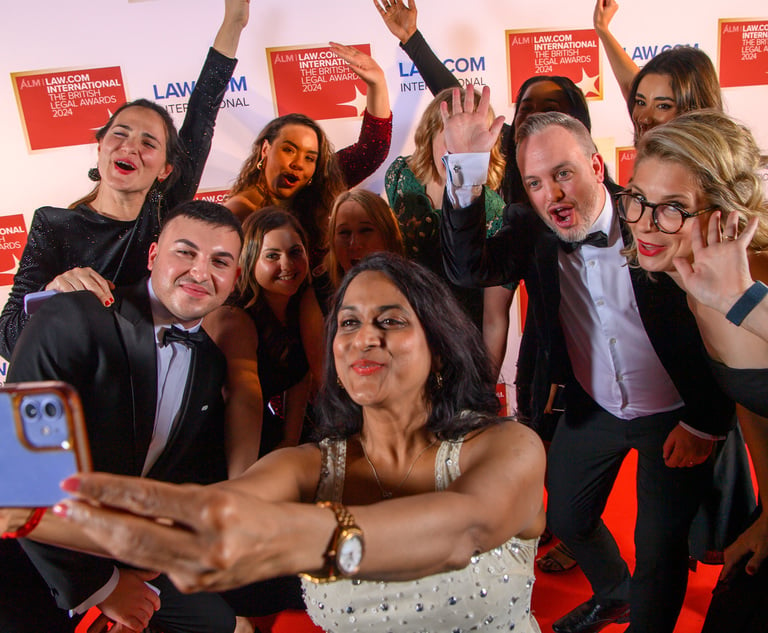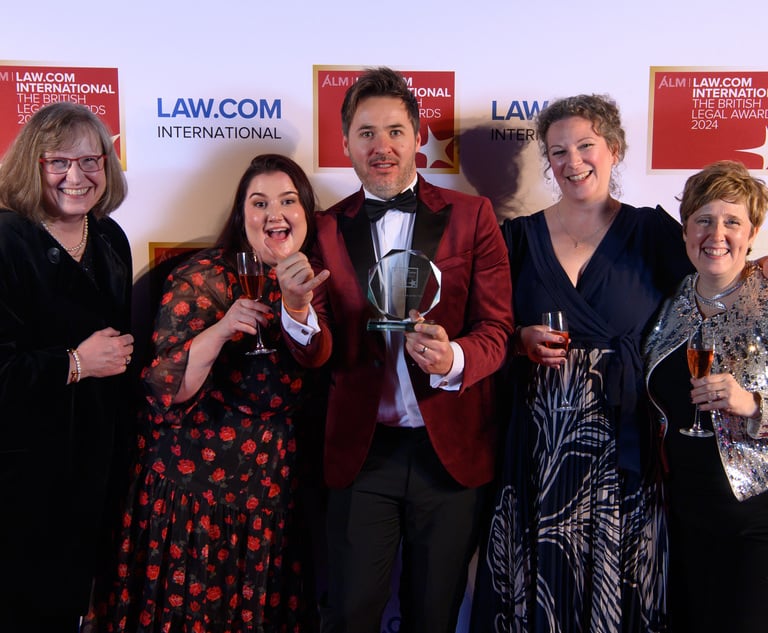'We Must Collaborate, Not Keep Our Cards Close To Our Chests' – Stephanie Hamon On The Future of Legaltech
Stephanie Hamon is co-chair of this year's Legal Week Strategic Technology Forum, taking place on 19-21 June.
May 20, 2019 at 12:49 AM
6 minute read
Former Barclays managing director, head of external engagement Stephanie Hamon is co-chair of Legal Week's 2019 Strategic Technology Forum, which is taking place next month. Ahead of the event, she discusses AI, collaboration, and what she thinks is the most exciting thing in the legaltech market at the moment.
What, in your eyes, is the most exciting development in the legaltech market at the moment?
Although I might of course be biased, I think what Barclays is doing with its Eagle legal labs is really great. It's bringing a momentum to create a collaborative space, and there's been a lot of interest from the law society and government of Singapore.
Legal Labs is about creating a venue to incubate legal technology companies, in partnership with several law firms and some academic institutions including UCL and the University of Liverpool. So it's about creating an environment for legaltech startups to thrive. In the lab they have access to the Barclays legal function, so can talk to lawyers to see if their solutions have any merits and to hear the voice of their would-be clients.
There's lots of tools out there around legal technology, but what I think is really good is something that allows everyone to speak together, where everyone collaborates.
What is the biggest challenge facing the legal technology market right now?
There's been so many developments with law tech companies claiming they're the only one doing it, so it's hard to know what competition there is out there and what they are up to. It's about knowing the competition and having access to the market.
During your time at Barclays, what was the most innovative use of technology you experienced?
We've been somewhat disappointed by what we've seen so far. There's a lot of talk about AI but a lot of it isn't truly AI.
We've been more excited by innovation and about how people are reinventing the way they deliver their services, and it's been exciting to see how people respond to feedback where we tell them it hasn't gone too well.
So there's been nothing yet that's really made you go 'wow!'?
There have been some that have got me excited, but it did also dependent on what role I was in. A lawyer in private practice would probably be excited about something very different.
Ones which I've been most excited about are ones that do legal spend analytics, whether AI powered or not. These suddenly give you far more information for you to make your decisions in the running of your business.
Are banks ahead of the market in terms of legaltech?
After attending various conferences, I've found that there's innovation in very different areas of the market.
One of the people I would use as an example is Rob Booth [Crown Estate general counsel] – he's not in the banking world and doesn't have the same size budget but what he's done has been very innovative and transformative.
So it's not a question of budget, sector or size but of leadership.
What do you think is the future of legal technology? What's going to be the next big thing?
From a client perspective, what I want is an integrated solution – maybe one tool which integrates all the legaltech companies. That's the direction we should be going in – an integration of all the different ideas into one collaborative platform.
Is there a sort of reluctance from companies to collaborate because they're competing against each other?
I'm not sure, because there is a lot of collaboration already.
We will all benefit more from collaborating instead of keeping our cards close to our chests. We need to look at the bigger picture because everyone's going to struggle, so we need to provide clarity through a collaborative solution.
What are the key themes going to be discussed at the Strategic Technology Forum?
The overall idea behind the event is to broaden the conversation around innovation and to have practical conversations with people who are driving change in the market.
Day one is about legal services delivery: first how you create innovation and new technology, then how to deliver it, then about how you form a relationship with the client and understand what it is they want.
Day two is focused on individuals and how to equip people to help them grasp what innovation is really about and for them to foster the right mindset for it. Then we'll be talking about the positive impacts of diversity – discussing topics such as the unconscious bias. It'll be about how to develop the right culture in your company to create that innovation mindset.
Day three is about the tools that can drive change and innovation. The first tool explored will be the psychology behind driving change, and the second is the data. We'll finish by discussing something that is not itself a tool but is related – the cybersecurity risks that arise with technological changes.
Why are these topics so important for the current legal market?
Change is finally happening and there's a lot of good initiatives out there. So now we need to bring everyone together to agree on what the most important topics should be.
It's hard to see the wood from the trees at the moment – sometimes it's hard to tell if something is a genuinely good idea or just has good marketing.
The market is fragmented at the moment – so it's now about not reinventing the wheel but instead creating a collaboration forum so that the whole legal ecosystem can benefit.
- The Strategic Technology Forum Europe will take place at La Quinta Golf Resort & Spa, Marbella, Spain on June 19-21, 2019. For more information see here.
This content has been archived. It is available through our partners, LexisNexis® and Bloomberg Law.
To view this content, please continue to their sites.
Not a Lexis Subscriber?
Subscribe Now
Not a Bloomberg Law Subscriber?
Subscribe Now
NOT FOR REPRINT
© 2025 ALM Global, LLC, All Rights Reserved. Request academic re-use from www.copyright.com. All other uses, submit a request to [email protected]. For more information visit Asset & Logo Licensing.
You Might Like
View All

The British Legal Awards 2024: Who Won What and Why—Transactional Awards

Kenya to Host Inaugural African Legal Technology & Innovation Awards in 2025

Trending Stories
- 1Wachtell Partner Leaves to Chair Latham's Liability Management Practice
- 2Morris Nichols Partners to Be Involved With PLI Program
- 3How I Made Practice Group Chair: 'Cultivating a Culture of Mutual Trust Is Essential,' Says Gina Piazza of Tarter Krinsky & Drogin
- 4People in the News—Feb. 3, 2025—Antheil Maslow, Kang Haggerty, Saxton & Stump
- 5Patent Pending ... and Pending ... and Pending? Brace Yourself for Longer Waits
Who Got The Work
J. Brugh Lower of Gibbons has entered an appearance for industrial equipment supplier Devco Corporation in a pending trademark infringement lawsuit. The suit, accusing the defendant of selling knock-off Graco products, was filed Dec. 18 in New Jersey District Court by Rivkin Radler on behalf of Graco Inc. and Graco Minnesota. The case, assigned to U.S. District Judge Zahid N. Quraishi, is 3:24-cv-11294, Graco Inc. et al v. Devco Corporation.
Who Got The Work
Rebecca Maller-Stein and Kent A. Yalowitz of Arnold & Porter Kaye Scholer have entered their appearances for Hanaco Venture Capital and its executives, Lior Prosor and David Frankel, in a pending securities lawsuit. The action, filed on Dec. 24 in New York Southern District Court by Zell, Aron & Co. on behalf of Goldeneye Advisors, accuses the defendants of negligently and fraudulently managing the plaintiff's $1 million investment. The case, assigned to U.S. District Judge Vernon S. Broderick, is 1:24-cv-09918, Goldeneye Advisors, LLC v. Hanaco Venture Capital, Ltd. et al.
Who Got The Work
Attorneys from A&O Shearman has stepped in as defense counsel for Toronto-Dominion Bank and other defendants in a pending securities class action. The suit, filed Dec. 11 in New York Southern District Court by Bleichmar Fonti & Auld, accuses the defendants of concealing the bank's 'pervasive' deficiencies in regards to its compliance with the Bank Secrecy Act and the quality of its anti-money laundering controls. The case, assigned to U.S. District Judge Arun Subramanian, is 1:24-cv-09445, Gonzalez v. The Toronto-Dominion Bank et al.
Who Got The Work
Crown Castle International, a Pennsylvania company providing shared communications infrastructure, has turned to Luke D. Wolf of Gordon Rees Scully Mansukhani to fend off a pending breach-of-contract lawsuit. The court action, filed Nov. 25 in Michigan Eastern District Court by Hooper Hathaway PC on behalf of The Town Residences LLC, accuses Crown Castle of failing to transfer approximately $30,000 in utility payments from T-Mobile in breach of a roof-top lease and assignment agreement. The case, assigned to U.S. District Judge Susan K. Declercq, is 2:24-cv-13131, The Town Residences LLC v. T-Mobile US, Inc. et al.
Who Got The Work
Wilfred P. Coronato and Daniel M. Schwartz of McCarter & English have stepped in as defense counsel to Electrolux Home Products Inc. in a pending product liability lawsuit. The court action, filed Nov. 26 in New York Eastern District Court by Poulos Lopiccolo PC and Nagel Rice LLP on behalf of David Stern, alleges that the defendant's refrigerators’ drawers and shelving repeatedly break and fall apart within months after purchase. The case, assigned to U.S. District Judge Joan M. Azrack, is 2:24-cv-08204, Stern v. Electrolux Home Products, Inc.
Featured Firms
Law Offices of Gary Martin Hays & Associates, P.C.
(470) 294-1674
Law Offices of Mark E. Salomone
(857) 444-6468
Smith & Hassler
(713) 739-1250









